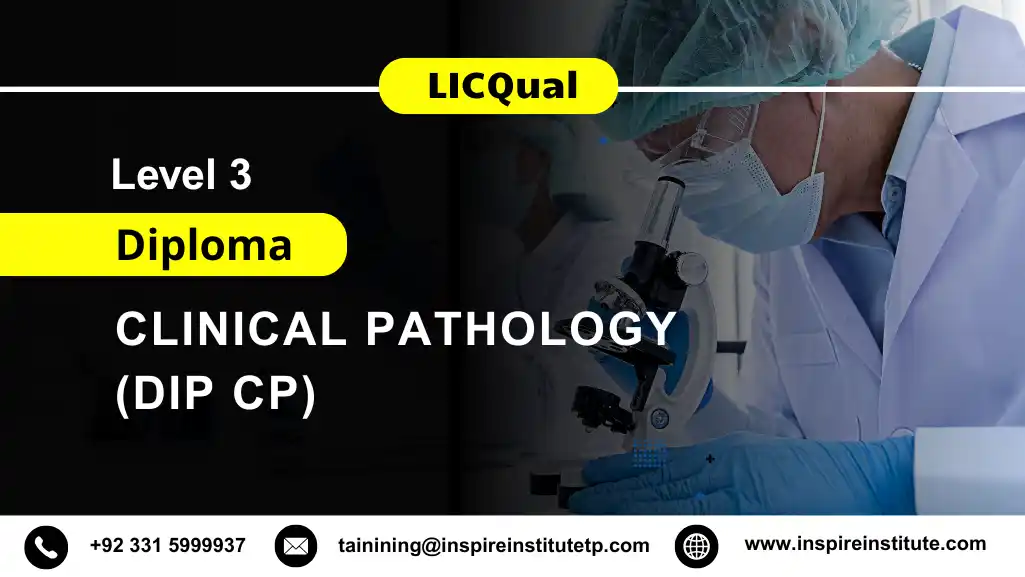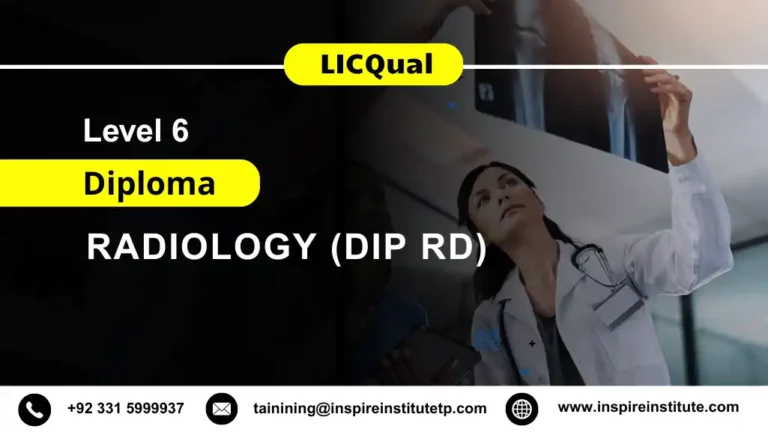LICQual Level 3 Diploma in Clinical Pathology (Dip CP)
The LICQual Level 3 Diploma in Clinical Pathology (Dip CP) is a specialised qualification designed for learners who wish to develop foundational knowledge and practical skills in laboratory medicine. Clinical pathology plays a vital role in modern healthcare by supporting accurate diagnosis, guiding treatment plans, and monitoring patient outcomes. This diploma introduces learners to the essential principles and practices of pathology, preparing them to contribute effectively in healthcare, laboratory, and clinical environments.
The Level 3 Diploma in Clinical Pathology provides a broad understanding of laboratory investigations, diagnostic techniques, and the role of pathology in patient care. Learners explore core topics such as hematology, microbiology, biochemistry, and immunology, gaining insights into how laboratory analysis informs clinical decisions. By focusing on both theory and application, the programme ensures that learners are equipped with the skills necessary to support safe and effective healthcare practices.
One of the key aims of the LICQual Diploma in Clinical Pathology is to develop practical competence in laboratory methods and diagnostic testing. Learners acquire skills in sample collection, preparation, and analysis, along with the ability to interpret laboratory results accurately. This hands-on approach strengthens their ability to apply knowledge in real-world medical and healthcare settings, making them valuable contributors to multidisciplinary teams.
The Dip CP course also emphasises critical thinking, problem-solving, and evidence-based practice. Learners will gain an appreciation of the ethical and professional standards that underpin pathology, ensuring accuracy, reliability, and integrity in laboratory work. These competencies are vital for building trust in healthcare systems and ensuring patients receive the highest standard of care.
This qualification is particularly suitable for those seeking to enter the healthcare and laboratory sector, as well as professionals who wish to enhance their knowledge of clinical diagnostics. The LICQual Level 3 Clinical Pathology Diploma supports career development in hospitals, clinics, diagnostic laboratories, and public health organisations. It also provides an excellent foundation for learners aiming to progress into advanced studies in pathology, biomedical sciences, or related fields.
The LICQual Level 3 Diploma in Clinical Pathology (Dip CP) is an academically rigorous and professionally relevant programme that equips learners with specialist knowledge, practical laboratory skills, and a recognised qualification. By completing this diploma, learners will be prepared to support accurate medical diagnosis, contribute to healthcare improvement, and advance their careers in the ever-evolving field of clinical pathology.
Why Choose this Qualification
The LICQual Level 3 Diploma in Clinical Pathology (Dip CP) is designed for learners who want to build a strong foundation in laboratory medicine and diagnostic sciences. Clinical pathology is central to modern healthcare because it provides essential insights into disease detection, monitoring, and treatment planning. This qualification offers both theoretical knowledge and practical skills, making it an excellent choice for learners who aspire to enter the healthcare or laboratory sector or advance in their current career.
Key Reasons to Choose this Qualification
1. Comprehensive Knowledge of Clinical Pathology
- Gain an in-depth understanding of hematology, microbiology, biochemistry, and immunology.
- Study the role of laboratory investigations in supporting accurate medical diagnosis.
- Explore the connection between pathology and clinical decision-making.
- Learn about both common and complex medical conditions through laboratory evidence.
2. Practical Laboratory Skills Development
- Acquire competence in sample collection, preparation, and safe handling.
- Learn the principles of diagnostic testing and laboratory analysis.
- Develop the ability to interpret laboratory results with accuracy.
- Apply knowledge through practical case-based assessments and assignments.
3. Career Advancement in Healthcare and Diagnostics
- Enhance employability in hospitals, diagnostic laboratories, and public health institutions.
- Build professional skills recognized across the healthcare sector.
- Strengthen your CV with a UK-accredited qualification in clinical pathology.
- Open pathways to higher-level studies in biomedical sciences or healthcare.
4. Ethical and Professional Standards Training
- Understand the importance of accuracy and reliability in laboratory work.
- Learn professional codes of conduct related to clinical pathology.
- Gain awareness of patient confidentiality and ethical handling of medical data.
- Develop responsibility and accountability in clinical decision support.
5. Evidence-Based and Modern Curriculum
- Study updated scientific approaches aligned with current medical practices.
- Explore the role of evidence-based healthcare in laboratory medicine.
- Gain exposure to modern diagnostic techniques and technologies.
- Stay aligned with international healthcare and pathology standards.
6. Flexible Learning and Assessment
- Progress through an assignment-based learning structure.
- Balance academic learning with professional or personal commitments.
- Develop independent study habits suited for lifelong learning.
- Gain structured guidance while building self-motivation and responsibility.
7. Global Recognition and Transferability
- Earn a UK-accredited diploma recognized internationally.
- Increase opportunities for employment or further study abroad.
- Enhance your professional profile with a credible, industry-relevant qualification.
- Stand out in competitive healthcare and diagnostic sectors worldwide.
8. Contribution to Improved Healthcare Outcomes
- Play a key role in early disease detection and treatment planning.
- Support medical teams with accurate laboratory findings.
- Contribute to improving patient outcomes through reliable diagnostic support.
- Help strengthen public health initiatives through applied pathology knowledge.
The LICQual Level 3 Diploma in Clinical Pathology (Dip CP) is an ideal choice for learners seeking to develop professional competence in laboratory medicine and diagnostics. With its blend of specialist knowledge, practical skills, ethical grounding, and international recognition, this diploma empowers learners to advance their careers while contributing to the improvement of healthcare services. Choosing this qualification means gaining a pathway to both personal growth and professional success in the vital field of clinical pathology.
Course Overview
LICQual UK Awarding Body
Average Completion Time:
4-12 Months
Study Units: 6 Units
Evidence & Assignment Based
Mandatory Units
Who Should Take This Course
The LICQual Level 3 Diploma in Clinical Pathology (Dip CP) is a specialized qualification designed for individuals who are passionate about laboratory medicine, medical diagnostics, and healthcare support services. Clinical pathology is a vital field within healthcare, as it provides critical insights into disease detection, monitoring, and treatment planning. This diploma equips learners with the theoretical knowledge and practical skills required to work effectively in clinical laboratories, hospitals, and diagnostic centers, making it a suitable choice for a wide range of learners.
This Course is Suitable For
Aspiring Laboratory and Healthcare Professionals
- Build a strong understanding of hematology, microbiology, biochemistry, and immunology.
- Learn to conduct laboratory investigations and apply diagnostic principles.
- Develop skills to handle, prepare, and analyze medical samples with accuracy.
- Gain confidence in supporting clinical decision-making through reliable test results.
Nursing and Healthcare Assistants
- Enhance knowledge of diagnostic testing and laboratory processes.
- Improve skills in sample collection, patient preparation, and reporting results.
- Strengthen collaboration with laboratory and clinical teams.
- Acquire internationally recognized skills to progress within healthcare roles.
Medical Students and Early Career Practitioners
- Use this diploma as a foundation for further studies in pathology or biomedical sciences.
- Gain early exposure to laboratory-based diagnostic methods and professional standards.
- Develop problem-solving and analytical skills in interpreting laboratory findings.
- Build competence in applying evidence-based practices in clinical settings.
Allied Health Professionals
- Strengthen clinical laboratory knowledge to support multidisciplinary healthcare teams.
- Learn preventive approaches through laboratory screening and diagnostic testing.
- Improve healthcare delivery through reliable interpretation of lab results.
- Gain specialist skills that enhance existing qualifications and professional roles.
Community Health Workers and Diagnostic Assistants
- Acquire essential skills to support local clinics, diagnostic centers, and hospitals.
- Learn to recognize abnormal test results that may indicate underlying diseases.
- Develop preventive health practices through laboratory-based screening methods.
- Enhance the ability to support doctors, nurses, and laboratory scientists in community health initiatives.
Individuals Seeking a Career Change into Healthcare
- Begin a career in healthcare and laboratory sciences with a recognized UK qualification.
- Gain specialized knowledge in clinical pathology without requiring a medical background.
- Acquire transferable skills applicable to hospitals, laboratories, and public health centers.
- Build confidence to progress into advanced education or professional roles.
International Learners Aiming for Global Healthcare Careers
- Earn a globally recognized diploma that enhances employability across borders.
- Gain knowledge and skills aligned with international laboratory and diagnostic standards.
- Strengthen professional profiles for roles in hospitals, diagnostic labs, and public health institutions worldwide.
- Open pathways to higher education and advanced studies in clinical pathology or biomedical sciences.
Volunteers and NGO Workers in Health Programs
- Develop expertise to contribute effectively to healthcare and diagnostic outreach projects.
- Learn the essentials of clinical pathology relevant to field and community health initiatives.
- Improve the ability to deliver diagnostic support services in under-resourced areas.
- Gain confidence in making a positive impact on global health outcomes.
The LICQual Level 3 Diploma in Clinical Pathology (Dip CP) is ideal for anyone committed to advancing their knowledge and skills in laboratory medicine and diagnostics. Whether you are an aspiring healthcare professional, a current practitioner, or someone looking to enter the medical field, this qualification provides the foundation, expertise, and recognition needed to excel in clinical pathology. By choosing this course, learners not only enhance their career opportunities but also contribute meaningfully to the accuracy and effectiveness of modern healthcare.
Course Benefits
The LICQual Level 3 Diploma in Clinical Pathology (Dip CP) provides significant benefits for individuals seeking to build expertise in diagnostic medicine, laboratory procedures, and clinical pathology practices. By combining essential theoretical knowledge with practical applications, this diploma equips learners to support accurate diagnoses, perform laboratory investigations, and contribute to improved patient care. Designed as a flexible, assignment-based programme, it ensures professional development while maintaining academic excellence and relevance in today’s healthcare sector.
Key Benefits of the Course:
- Specialist Knowledge
Gain a solid foundation in hematology, microbiology, immunology, and biochemistry.
Learners explore the principles of diagnostic testing, laboratory analysis, and clinical reporting.
The course covers specimen collection, processing, and interpretation of results.
Training emphasizes ethical, accurate, and evidence-based laboratory practices. - Practical Application
Develop competence in handling and analyzing blood, tissue, and fluid samples.
Learn to apply diagnostic techniques for disease detection and treatment monitoring.
Gain skills in laboratory safety, infection prevention, and quality control procedures.
Apply theoretical knowledge directly in hospitals, diagnostic labs, and clinical settings. - Recognised Qualification
Earn a UK-accredited diploma that validates advanced knowledge in clinical pathology.
Strengthen professional credibility with recognition aligned to global healthcare standards.
Enhance employability across hospitals, diagnostic centers, and research institutions.
Gain a qualification valued by both local and international healthcare providers. - Flexible Learning Pathway
Benefit from an assignment-based study model that supports work and study balance.
Advance academically without disrupting ongoing professional responsibilities.
Ideal for healthcare assistants, laboratory technicians, and career changers.
Study at a pace that suits personal and professional commitments. - Evidence-Based Training
Explore the latest diagnostic methods, laboratory guidelines, and testing protocols.
Learn evidence-driven approaches to ensure reliable and accurate results.
Understand the role of pathology in prevention, early detection, and treatment support.
Build expertise in applying diagnostic insights to improve patient outcomes. - Career Development
Open pathways to roles in hospitals, laboratories, clinics, and public health organizations.
Prepare for careers as laboratory assistants, pathology technicians, or diagnostic support staff.
Expand opportunities for further study in biomedical science, healthcare, and laboratory medicine.
Gain skills that increase employability and career mobility in the healthcare sector. - Enhanced Healthcare Delivery
Contribute to effective patient care by providing accurate and timely diagnostic data.
Support doctors and healthcare teams in clinical decision-making.
Improve healthcare outcomes through high-quality laboratory practices.
Play a critical role in disease management and community health improvement. - Professional Growth
Strengthen analytical and problem-solving abilities in diagnostic medicine.
Develop communication and teamwork skills for interdisciplinary collaboration.
Build professional ethics, accuracy, and responsibility in laboratory work.
Adapt to advancements in laboratory technologies and clinical practices.
The LICQual Level 3 Diploma in Clinical Pathology (Dip CP) equips learners with vital knowledge, practical competence, and a UK-recognised qualification. It empowers healthcare professionals, laboratory staff, and aspiring practitioners to support accurate diagnoses, improve patient outcomes, and advance their careers in the dynamic and essential field of clinical pathology.
Eligibility Criteria
The LICQual Level 3 Diploma in Clinical Pathology (Dip CP) is a UK-accredited programme designed for aspiring healthcare professionals, laboratory assistants, technicians, and community health practitioners who wish to build a strong foundation in diagnostic medicine and clinical laboratory sciences. This assignment-based qualification combines essential theoretical knowledge with practical applications, making it suitable for medical students, healthcare assistants, allied health professionals, and individuals aiming to specialize in pathology and diagnostic support. By meeting the entry requirements, learners ensure they are fully prepared to succeed in the programme and apply their knowledge effectively in hospitals, laboratories, clinics, and public health institutions.
Educational Background:
Applicants should hold a recognised healthcare or science-related qualification such as a diploma in healthcare practice, medical laboratory technology, nursing, or an equivalent qualification. Candidates with Level 2 or Level 3 qualifications in healthcare, biomedical science, clinical science, or related disciplines may also be considered. Equivalent international qualifications will be reviewed on a case-by-case basis to ensure they meet the suitability standards for the programme.
Professional Experience:
While prior experience in laboratory work, diagnostics, or healthcare is beneficial, it is not strictly mandatory. A minimum of one year of healthcare, laboratory practice, or related professional experience is recommended. Applicants with exposure to diagnostic testing, pathology support, or clinical investigations will benefit greatly from the course, though motivated learners without direct experience are also encouraged to apply.
Age Requirement:
Learners must be at least 18 years of age at the time of enrolment, ensuring they possess the maturity, responsibility, and commitment required for training in clinical pathology. This requirement ensures that candidates can engage effectively with both the academic and practical aspects of the qualification.
Language Proficiency:
Since the programme is delivered in English, learners should demonstrate strong reading, writing, and communication skills. A minimum IELTS score of 6.0 or an equivalent qualification is recommended for non-native English speakers. This ensures learners can complete assignments, engage with course resources, and interact professionally within academic and healthcare settings.
Technical Requirements:
Applicants should have access to a computer or laptop with a reliable internet connection. Basic IT skills are necessary to navigate online learning platforms, conduct research, and submit assignments digitally. Familiarity with word processing tools, spreadsheets, and digital study resources will support a smoother and more effective learning experience.
Required Documents:
Submission of a valid ID or passport, proof of educational qualifications, and evidence of any healthcare, laboratory, or related professional experience (if applicable) is required for registration. Applicants presenting international qualifications may be asked to provide additional documentation for verification to ensure eligibility..
The Qualification Process
LICQual Level 3 Diploma in Clinical Pathology (Dip CP) follows a structured pathway to ensure learners gain comprehensive knowledge, practical skills, and professional competence in community oral healthcare.
Step 1: Self-Assessment
Learners review the entry requirements to confirm eligibility. Candidates with a background in dentistry, oral health, or public health are encouraged to apply.
Step 2: Registration
Complete the registration process by submitting required documents such as proof of qualifications, a valid ID, and payment of enrollment fees.
Step 3: Induction
An induction session is conducted to:
- Verify learner eligibility and documentation.
- Introduce study materials, learning outcomes, and assessment procedures.
Step 4: Learning and Evidence Submission
Learners complete assignments, case studies, and practical exercises demonstrating competence in public health dentistry, community oral health assessment, preventive strategies, and program planning.
Step 5: Feedback and Revision
Assessors review submitted evidence and provide constructive feedback. Learners can revise and resubmit work to meet all required standards.
Step 6: Competence Validation
Final submissions are evaluated to confirm that learners have met all theoretical and practical learning outcomes.
Step 7: Internal Quality Assurance (IQA)
The IQA team reviews the assessment process to ensure accuracy, fairness, and compliance with international standards.
Step 8: External Verification (EQA)
External verifiers validate the authenticity and quality of learner achievements.
Step 9: Certification
Upon successful verification, learners are awarded LICQual Level 3 Diploma in Clinical Pathology (Dip CP) , demonstrating advanced proficiency in community oral healthcare and preparing them for professional growth in dental public health, preventive dentistry, and healthcare policy.







